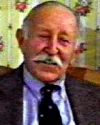(1918-2001)
 You don't expect erudition from a TV sportcaster. Their jobs are to describe the action and add interesting and relevant anecdotes and analysis to the pictures on the screen. That is, unless the sportscaster was Heywood Hale Broun.
You don't expect erudition from a TV sportcaster. Their jobs are to describe the action and add interesting and relevant anecdotes and analysis to the pictures on the screen. That is, unless the sportscaster was Heywood Hale Broun.
Broun was the son of legendary newspaperman Haywood Broun, who made a reputation as a drama critic and general columnist for various New York newspapers in the 20s and 30s* and was a member of the legendary Algonquin Round Table. His mother was Ruth Hale, a journalist and early feminist. Haywood Hale son was educated in private schools and graduated from Swarthmore College, before following in his father's footsteps and getting a job as a sportwriter. His newspapers, PM and The New York Star failed, so he went into acting, appearing in a long series of Broadway flops** and in bit parts on TV, soap operas, and a few movies***. Finally, in 1965, Broun was hired by CBS to be a sports commentator.
There was probably no one who looked less like a sportscaster. With his handlebar moustache and penchant for wearing loud multicolor sportcoats, Broun was quite a figure. CBS used him for local sports commentary, as well as national comments on the World Series. He was best known for his coverage of horse racing. For years when CBS covered a race, Woody was there. Here's him as he does the pre-race show for the 1973 Belmont Stakes (won by Secretariat):
Any sportscaster who can use the phrase "dearth of winners" is someone who loves the language.
The event I associated with him the most closely was the 1969 World Series. In the third game, Tommy Agee had one of the greatest single performances in World Series history: hitting a leadoff home run and making two great catches that saved at least four and possibly five runs. Since the games were played during the day (and I was in school), I couldn't see it. But I do remember Broun's commentary that evening, making Agee seem like a sports immortal.
Broun also wrote books. His Timultuous Merriment was a real favorite of mine. And sports book that starts out with describing an incident from The Life of Samuel Johnson is not your usual book. Broun saw sports are more than just winning or losing, but a test of character and also a means of fun.
Broun was seen far less at time went on. Once ABC started broadcasting the Triple Crown races, he lost his biggest stage, though he continued on sports shows, often with footage of him at the original events. He died in 2001.
________________________________________________
*Interestingly, he started out as a sportswriter.
**Only one show lasted longer than a month; his one off-Broadway credit managed to run 36 performances.
***One of the most notable was in The Odd Couple, where he plays a sportswriter who tells Oscar that he as missed seeing the Mets perform a triple play.
5 comments:
I have an audio tape of Broun's interview of Jacob Bronowski.
I searched but could not find his wonderful bit about the endangered "gefilte fish"... If anyone could find video of that, what a treasure! (I'm writing an email to a client of mine who goes fishing a lot and never heard of gefilte fish. She offered me a jar of fish she had canned, but she never heard of gefilte fish).
I knew Woody and went to school with his son who died in his 20s. Secretariat did not merely "win" the Belmont in 1973, he cemented his position in the zodiac as he lapped the field seemingly in a tour de force that transcended the close odds on the field, for there was really no doubt that any other outcome was in the offing unless a demented bookie had hired a hitman.
I met Woody briefly after our school hiking group had been trapped in a snowstorm overnight on the Appalachian trail near Bromley, Vermont. Woody had been at Bromley Ski Area doing a sports report that weekend (December 15th, 1968) and when the news of our rescue and removal from the woods to Bromley House in Peru, Vermont reached the CBS crew, Broun left the ski area and traveled the short distance to Bromley house to do his story on us. I remember him saying, that he wished he had interviewed me first, as he had already gotten his on air interviews from the first hikers brought back on the snowcat transporters to the lodge. I was in the third load of hikers brought down and didn't end up on air, but it was an interesting experience meeting and talking to Woody that night. He was quite the gentleman, and was very kind. They don't make them like that anymore.
Just listened to his exquisite color commentary of Secretariat’s win at the Belmont. Carefully and artfully used the language. You could tell he knew it wasn’t about him unlike the noise machines today.
Post a Comment